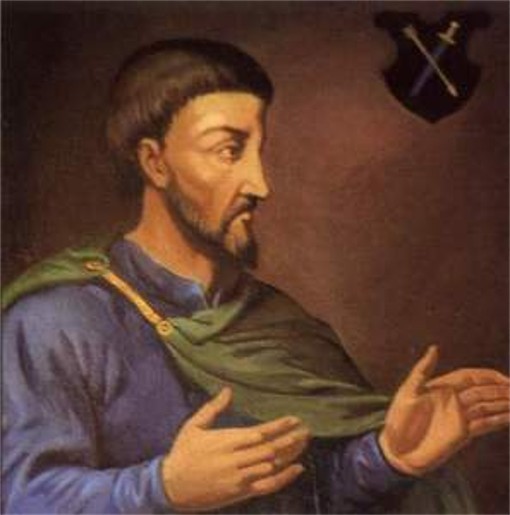Mnohohrishny, Demian
Mnohohrishny, Demian [Mnohohrišnyj, Dem'jan], b ca 1630 in Korop, Chernihiv region, d after 1701 in Selenginsk Staryi, Trans-Baikal province, Siberia. (Portrait: Demian Mnohohrishny.) Hetman of Left-Bank Ukraine. As colonel of Chernihiv regiment (1665–9) he participated in the 1668 anti-Muscovite rebellion led by Hetman Ivan Briukhovetsky. In June 1668 Hetman Petro Doroshenko appointed Mnohohrishny acting hetman in Left-Bank Ukraine. In the autumn Mnohohrishny pledged loyalty to the tsar and was recognized as ‘Siversk hetman.’ On 13 March 1669 he was elected full hetman of Left-Bank Ukraine. Soon thereafter Mnohohrishny signed the Hlukhiv Articles with Moscow. A staunch supporter of Ukrainian independence, he spoke out against Muscovite encroachments and Muscovy's territorial concessions to Poland, and later he conducted secret negotiations with P. Doroshenko and sent him money and troops to fight the Poles. Mnohohrishny favored autocratic rule by a strong hetman. He did not trust the senior Cossack starshyna, and appointed many of his relatives colonels and captains and granted them estates. In 1671 he appointed, with the approval of the Council of Officers, his brother, Vasyl Mnohohrishny, as acting hetman, possibly to ensure his succession. The act generated much opposition among the already aggrieved starshyna, and they engineered a Moscow-supported coup.
Mnohohrishny was arrested in Baturyn on 23 March 1672 and secretly taken with his brother, Vasyl Mnohohrishny, and nephew, Mykhailo, in chains to Moscow. There he was charged with high treason, tortured, and sentenced to death. The sentence was commuted to exile for life in Siberia. Mnohohrishny was released from the prison in Irkutsk in 1682 and accorded the status of a junior boyar. He was reimprisoned in 1684 at the request of Hetman Ivan Samoilovych. After being released in 1688, he became commander of the Russian garrison in Selenginsk. He entered a monastery in 1696 and was still alive in 1701. Mnohohrishny's popularity as hetman is reflected in the Cossack chronicles and in Istoriia Rusov.
BIBLIOGRAPHY
Antonovich, V.; Bets, V. Istoricheskiia deiateli Iugo-Zapadnoi Rossii, 1 (Kyiv 1884)
Kostomarov, N. ‘Ruina Getmanstva Briukhovetskago, Mnogogreshnago i Samoilovicha,’ in his Sobranie sochinenii, vol 15, bk 6 (Saint Petersburg 1905)
Arkadii Zhukovsky
[This article originally appeared in the Encyclopedia of Ukraine, vol. 3 (1993).]

